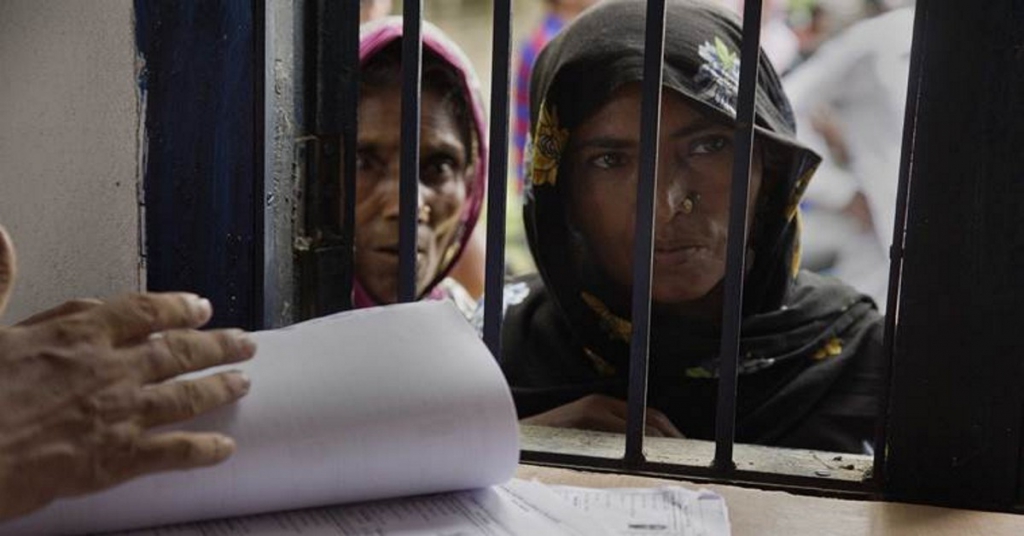
Private bill to deport ‘intruders’ reveals communal agenda Insidious Private Members' Bill following on the heels of the NRC final draft betrays a communal agenda, curbs court powers
08, Sep 2018 | Zamser Ali
The Illegal Immigrants (Identification and Deportation Bill, 2018 tabled by a BJP MP from Rajasthan seeks to snatch away the power of the lower and higher judiciary while unleashing communal propaganda in the country
Guwahati, September 8:There appears to be another sinister game-plan underway. At a time when NRC is being updated in Assam for identification of Indian Citizens in Assam, under the supervision of the Supreme Court, a private member’s bill ((The Illegal Immigrants (Identification and Deportation Bill, 2018))) has been quietly tabled in the Upper House of the Indian Parliament on August 6, 2018. This Private Member’s Bill, discreetly tabled by a law maker, Narayan Lal Panchariya from the ruling BJP from Rajasthan, raises suspicion and concern about the ruling dispensation’s motives around the Assam NRC issue. The Bill may be read here.
The aim and intent behind this Bill appears distinctly majoritarian and communal. In its Aims and Objectives, the reasoning it states,
“to provide for an institutional mechanism for identification of illegal immigrants in the country and their deportation and for matters connected therewith or incidental thereto.” The necessity for such a law, is stated as,
“it enacted by Parliament in the Sixty-ninth Year of the Republic of India as
follows:—
1. (1) This Act may be called the Identification and Deportation of Illegal Immigrants Act, 2018.
(2) It extents to the whole of India except the State of Jammu and Kashmir.
(3) It shall come into force on such date, as the Central Government may, by notification in the Official Gazette, appoint.”
Further, In the detailed aims and objectives of the bill it is said that “to provide for an institutional mechanism for identification of illegal immigrants in the country and their deportation and for matters connected therewith or incidental thereto.”
The fact that the bill was tabled just seven days after the publication of final draft of the NRC in Assam (July 30, 2018) makes it even more noteworthy, arousing suspicion. The vitreol unleashed against all those excluded from the final draft NRC in Assam, especially by the National President of BJP, Amit Shah, with the use of the term goospetiya (inflitrators) was not just a contempt of the process underway in the Supreme Court. Significantly, it was in the very state of Rajathsn, from where Pachariya hails, that Shah, two days after the publication of the final draft of the NRC, declared all the 40 lakh excluded persons as “illegal infiltrators” and even went further to state that his party would bring in an NRC process for all over India. In his speech that has rasied much controversy, Amit Shah not only dubbed all the people dropped from final draft NRC as Bangladeshi Nationals, but, by implication tried to label them as all ‘Muslim.
Now, in the proposed private members bill, the MP from Rajasthan has said, “Due to linguistic similarities between illegal migrants from Bangladesh, Myanmar and other neighbouring countries and the indigenous people, it becomes difficult to identify and deport the illegal immigrants from Indian soil. Illegal immigrants have increased pressure on resources of our country and the Government has to increase expenditure on education and health facilities. Illegal immigrants are not only adding number to our booming population but are indulging in criminal and anti-national activities. Most of the illegal immigrants have got their names enlisted in the voting list illegally, thereby claiming the rights of citizens.
“The NRC (National Register of Citizens) has taken initiatives for the detection of illegal migrants. However, success of such initiatives will depend on strong political will. This silent and insidious demographic invasion may result in the loss of the geo-strategic importance of several bordering districts in the States of Assam, Tripura, Jammu and Kashmir, West Bengal and other States. The influx of these illegal migrants is turning these regions into such ghettos where the original inhabitants have been reduced to a minority and are facing an identity crisis.
“In view of the dangers posed by illegal immigrants, the problem is required to be dealt effectively. Illegal migration from neighbouring countries is no longer a regional problem which can be pushed under the carpet since these migrants have now settled in several
States including the NCT of Delhi, Madhya Pradesh and Maharashtra.”
Though this private members bill has been tabled with an attempt to create a divide among India’s indigenous people, the dual standards of the BJP stand fully exposed. It is clear that the Draft has little to do with detection and deportation of Foreigners, but it is a ready tool for Communal incitement.
The ground level experience of Assam shows that from the 100 established Foreigners Tribunal and about a hundred Courts –right from the the Sub-Divisional Judicial Court to the Supreme Court of India — the on going foreigners issue has remained un-resolved for the last 50 years. The present bill is not only and attempt to crudely bypass and supersede theauthority of one hundred Foreigners Tribunal but by the introduction –instead– of only a three members National Commission and a State Commission with the same strength in every State –crudely attempts to bypass judicial authority and examination.
The Bill states that
“9. (1) Every State Commission shall—
(i) carry out necessary exercise to identify illegal immigrants and their nationality
within the areas under their jurisdiction; and
(ii) prepare a list of illegal immigrants and supply it to—
(a) the National Commission; and
(b) the district administration, which shall publish such list in the official
gazette:
Provided that an appeal against the inclusion of the name of an individual in the list
of illegal immigrants by the State Commission shall be made before the National Commission
within ninety days of publication of the said list in the official gazette.
(2) The National Commission shall take necessary action for deportation of illegal immigrants named in the list of illegal immigrants supplied by the State Commission;” The Present bill is a threat to the Judicial System in India, when it says, ” 11 (2) No court, except the Supreme Court and a High Court exercising jurisdiction under articles 226 and 227 of the Constitution shall entertain any suit, application or other proceedings in respect of any order made by the National Commission and the State Commission”
Clearly, this is a brazen attempt to not just centralise power but render infructuous all powers of the Subsidiary Courts of India. It is also a great threat to the Federal Structure of India.
The present bill, while allocating some powers to the the State Commission, has, in fact, centralised all powers for deportation to the Central Commission without fair adjudication processes. Besides, all power in this regard has been abborgated to the Union Government of India.
“Section 10. The Central Government may, if it considers so in national interest, exempt any illegal immigrants or any class of illegal immigrants from deportation or any other provisions of this Act.”
In this rather brazen and crude way, way the proposed bill has diminished and eroded all powers and functions of not only of State and Central Commissions that are proposed to be enacted under the Act. Hence it poses a real threat to the Indian Federal Structure. Finally, the aim is clear: the proposed bill is a means to generate and unelash communal propaganda against minority Muslims of India, something the ruling dispensation is repeatedly known to do.
Image: AP Photo/Anupam Nath









